Hawaii Logistics: Shoring Up Supply Chains
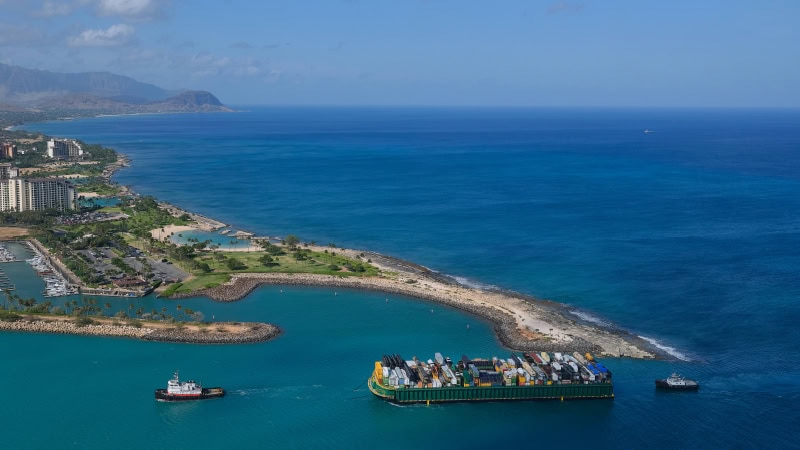
The Aloha State offers a stunning location and presents unique challenges for shippers. Here’s how top logistics companies ensure smooth sailing—and seamless air and ground movement—for cargo.
So close and yet so far away. The phrase is used to describe any number of life’s phenomena—including lost love, as per Hall & Oates—and the words aptly describe the relationship of Hawaii to the other U.S. states and the rest of the world. Admitted to the union as the 50th state on August 21, 1959, Hawaii is by no means last in terms of its economic importance, favorable climate, and popularity.
A tourist mecca, the Aloha State is renowned for its beauty, hospitality, and fun in the sun. But it represents much more than that for the state’s 1.4 million residents and its nearly 33,000 employer establishments as well as some 159,000 sole proprietorships.
To meet their needs, logistics professionals are challenged to capitalize on the “close” part of the “close and far away” equation. Fortunately for Hawaiians, the professionals meet the test very well indeed.
Feeding the Flow
“Freight forwarders are critical to the communities and businesses of Hawaii, given the state’s unique location 2,400 miles from the continental United States,” says James Beidleman, president and CEO, Honolulu Freight Service.
“Hawaii is one of the most remote island chains in the world,” he adds. “It is also a first-class vacation destination. Transit over water is slower and often impacted more heavily by weather than U.S. mainland shipping. Assets and real estate come at a premium and are scarce, but the expectation for logistic services is greater than most origin/destination combinations.”
By relying on a network of asset-based trucking companies, state-of-the-art terminals and warehouses, and logistics technologies that provide detailed, real-time tracking information, Honolulu Freight Service minimizes disruptions to cargo shipments over land, air, and sea.
The challenges facing logistics professionals include reaching the state’s residents spread across eight main islands (among 137 islands in all). At about 750 miles, Hawaii’s ocean coastline is the fourth-longest in the United States, making oceangoing transit a frequent means of travel and shipping.
Handling oceangoing cargo to and from Hawaii is a specialty of Aloha Marine Lines (AML), part of the Lynden family of companies providing transportation and logistics solutions in Hawaii, Alaska, Canada, the Pacific Northwest, and around the world.
In fact, Aloha Marine Lines recently added a new barge, the Makani Loa, to its fleet to serve customers in the Seattle-to-Hawaii trade lane. The Makani Loa is a sister Makani Class barge to the Kamakani and Namakani barges that were added to the AML fleet in 2020. The Makani Loa was constructed at Gunderson Marine & Iron in Portland, Oregon, and launched there in early March 2024.
The Makani Class barges measure 438 feet long and 105 feet wide with a deadweight capacity of 16,900 tons. They are fitted with high binwalls that help keep freight secure while minimizing the amount of lashing needed for each voyage.
Covering the Distance
Hawaii’s considerable distance from the mainland United States and other major markets poses logistical challenges affecting transportation costs, lead times, and supply chain reliability, notes Paul Talbert, vice president of sales at Approved Freight Forwarders, which offers ocean and air freight, logistics, warehousing, and road transport. Companies must devise efficient and creative strategies to bridge the geographical gap.
About 85% of the products consumed in Hawaii are imported from distant locations, Talbert says. This heavy reliance on imported goods underscores the importance of efficient logistics in maintaining a steady supply of essentials such as food, medicine, and other commodities. Weather and mechanical issues can significantly disrupt the flow of goods.
Hawaii is susceptible to natural disasters such as hurricanes, volcanic eruptions, and tsunamis— not to mention last year’s wildfires in Maui. “These events can disrupt transportation networks, damage infrastructure, and cause delays in shipments,” Talbert says. “Companies need contingency plans to navigate the impact of such disasters,” Talbert notes.
The vagaries of weather notwithstanding, logistics pros know that much about the island(s) remains constant.
The unique geography of the Aloha State means the challenges logistics providers face will never change. “Hawaii will always present unique challenges,” says Kane McEwen, president of DHX-Dependable Hawaiian Express, which offers both full container load (FCL) and less-than-container load (LCL) ocean freight and air freight services.
Using its transcontinental trucking network, DHX moves LCL/FCL shipments from any point in the country, and provides intermodal services to and from Hawaii and Guam. DHX also offers LCL and FCL eastbound service from Hawaii and Guam throughout the continental United States.
“Logistical execution in Hawaii is more complex than in the U.S. mainland,” McEwen says. “Shipment execution requires operational flexibility to perform services that require a range of equipment—flatbeds, lowboys, forklift in tow, pallet jacks, and hand trucks.
“This is required to effectively meet the service expectations of hotels and retailers with inside delivery, as well as construction/job-site, residential/home delivery, and final mile/white-glove delivery; providing shipment status visibility to our customers from the beginning of their shipment to the end is also an expectation,” he adds.
While the geographical challenges of Hawaii are constant, the expectations and needs of customers continually increase. “Within the ever-changing world of logistics, effective solutions have become more critical for businesses in Hawaii,” McEwen says.
Fortunately for businesses and residents, the state’s logistics providers stand ready to meet each challenge as it presents itself.
Honolulu Freight Service: Serving Hawaii for Nearly 90 Years
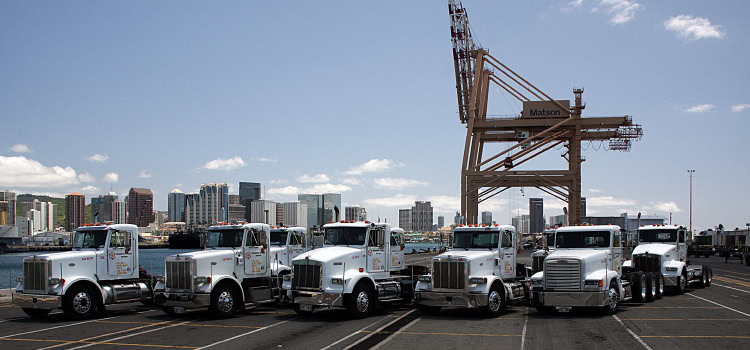
Transporting cargo to and from all major Hawaiian Islands and Guam, Honolulu Freight Service provides a comprehensive network as well as full-service supply chain capabilities.
Nearly 90 years ago, shortly after Paul Beidleman started handling shipments from Yuma, Arizona, to Los Angeles under the trucking company Yuma Merchants Express, he discovered an opportunity that would revolutionize the Hawaii shipping industry.
Southern California truckers didn’t like driving to the piers, where Paul often made deliveries bound for Hawaii on Matson ships. So he started doing it for them, spearheading the consolidation of freight to the islands with the founding of United Drayage.
That spirit of innovation continues to drive the company, now known as Honolulu Freight Service, or HFS. The company has served Hawaii longer than anyone else and is now the state’s largest LCL shipper, direct loading dry and refrigerated cargo to and from all major Hawaiian Islands and Guam.
“Ever since the beginning, Honolulu Freight Service has identified ways we can improve the shipping process and customer experience,” says Paul’s grandson, Honolulu Freight Service President and CEO James Beidleman. He is joined in the third generation of HFS family leadership by his brother Mark Beidleman, who serves as senior vice president and area manager in Southern California.
From the earliest days of using bright stickers to quickly identify packaged goods as they came off the ship, followed by plywood containers to minimize damage, to today’s state-of-the-art terminal and warehousing operations throughout the U.S. West Coast, Hawaii, and Guam, Honolulu Freight Service works closely with each customer to identify the best shipping solution for their cargo, budget, and timeline.
Investing in Infrastructure
In 2022 HFS purchased the former Love’s Bakery location in Honolulu to serve as the new HFS headquarters and 92,400-square-foot operations center, offering a central location to efficiently serve the entire island.
“Honolulu Freight has made a significant enhancement and contribution to logistics in Hawaii with the purchase and future remodel of our new terminal as well as acquiring trucking capacity on both Oahu and Maui,” James Beidleman says. “We maintain five strategic types of facilities throughout the state. Our inter-island division has grown throughout the years; we also continue to update our technology to be first in class.”
HFS also operates a 20,000-square-foot facility in West Oahu, which specializes in chill, dry, and frozen cargo warehousing with temperature-controlled environments.
The company also recently renovated its 2.63-acre Tacoma Terminal, adding a two-story administration building and a mechanic shop, as well as completely asphalting the property.
Connecting All 50 States
In addition to Honolulu and Tacoma, HFS terminal locations include Los Angeles and Oakland, California; Portland, Oregon; and Guam.
Honolulu Freight Service’s comprehensive network of all-points less-than-truckload and truckload services, as well as intermodal and multimodal services (steamship, barge, rail, and air), serves all 50 states.
Among its full-service capabilities are project shipping and logistics management; air freight; inter-island cargo; heavy and oversized loads; project consolidation and assembly; break-bulk, roll on/roll off; crane and heavy lift; vessel charters; door-to-door pickup and delivery; and a secure online Freight Tracker system.
Asset-based trucking divisions include Xpress Trucking, Inc., which offers Honolulu and Maui freight service trucking; HFS Brokerage, with trucking service to Northern and Southern California ports; and Allstate Transport, Inc., Seattle’s premier container drayage company.
“Logistics providers to Hawaii need to be familiar with ocean/consolidation/rail/truck and final-mile delivery all in one shop,” James Beidleman says. “Our ability to provide all of this is what makes Honolulu Freight stand out. Our service is as seamless as possible for our customers, and the investments we are making today will help us continue to be an industry leader in logistics in the Hawaiian Islands over the years to come.”
DHX: Serving Hawaii with Continuous Improvement
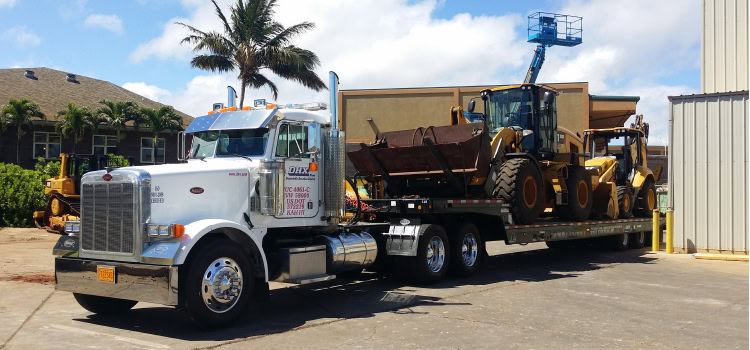
DHX helps support Hawaii’s overall economy with reliable logistics services, from project cargo to nationwide door-to-door service to and from Hawaii via ocean and air freight.
“Hawaii is the world’s most isolated and logistically challenged location,” says Kane McEwen of DHX-Dependable Hawaiian Express. “DHX has to continuously improve our services with the latest vessel cut-offs in the industry so that our customers can depend on the timely arrival of their goods.
“We partner with the most advanced ocean carriers with facilities in close proximity to ensure vessel arrival times remain constant week-to-week and costs remain equitable for our customers,” he adds.
DHX supports Hawaii’s overall economy with logistics services in numerous ways. “We’re an asset-based company on the islands with facilities on Oahu, Maui, and the Big Island,” McEwen explains. “As such, we provide a variety of transparent and reliable logistical solutions, including nationwide door-to-door service to and from Hawaii via LCL/FCL ocean and air freight, warehousing and distribution, on-island trucking, chill and frozen, project cargo, inter-island consolidations, and other customer-specific tailored solutions.”
Long and steady experience helps, too. “With an average employee tenure in excess of 20 years, our expertise yields a distinction to our customers in providing customized solutions, as we have been dedicated to the Hawaiian Islands with 40-plus years of experience,” he notes.
As for meeting the evolving needs of customers and consumers, McEwen stresses DHX’s commitment to keep in step. “DHX maintains a focus on continuous improvement,” he says. “Our customers and the Hawaii business climate continue to drive our evolution. Whether we are investing in new technology, expanding market services, or making cost structure changes, our focus remains dedicated to supporting the long-term viability of Hawaii’s business with a simplified cost-effective experience.”
Championing Sustainability
In addition, the company’s focus mirrors the Aloha State’s emphasis on environmental responsibility.
“The nature of our transportation and logistics business generates a large share of greenhouse gases,” McEwen acknowledges. “We are committed to reducing our carbon footprint by being innovative in such a way that we make a positive impact on society and our collective future. This means managing for the short and the long term by developing strategies that meet social and environmental needs.
“DHX is always looking for ways to evolve, with sustainability at the forefront,” McEwen adds. “We remain committed to our long-term strategies and continue to examine the ever-changing state regulations. We have purchased carbon offsets in sufficient quantity to power our warehouses, including our corporate headquarters.
“Our facilities in Honolulu, Maui, and Guam, as well as our corporate headquarters in Southern California, are entirely sufficient, drawing no or minimal additional energy from the electric grids,” he notes. “For us, sustainability needs to be about ‘greening’ because businesses and communities depend on healthy, productive ecosystems. We have and will continue to make it our mission to be the leader in our industry by walking the talk.”
DHX has grown to become one of the most respected ocean and air freight forwarders serving Hawaii, Guam, and the mainland United States. “Our success and growth are due to our customers’ constant demand for a commitment to quality services and providing value,” McEwen says. “Our Ohana (‘family’) is committed to meeting and exceeding our customers’ expectations by creating customized solutions, on-time delivery, on-island, and inter-island trucking, warehousing, and logistics services—all at competitive rates.”
Lynden: Expanding Services to Hawaii
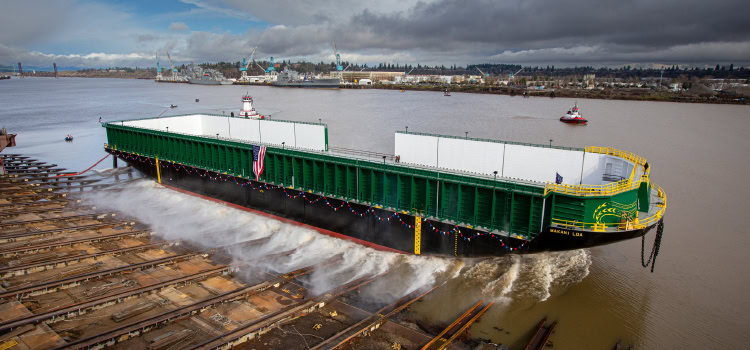
Aloha Marine Lines, part of the Lynden family of companies, recently launched the Makani Loa, a new barge for its Hawaii service.
Innovation is a key value of the Lynden family of companies, and shippers to and from Hawaii rely on Lynden’s barge company, Aloha Marine Lines (AML), to offer up-to-date and problem-solving solutions for oceangoing cargo.
Bret Harper, vice president of sales for Aloha Marine Lines, reports that the preparation of freight for shipment to and from Hawaii has evolved over the years. “With the addition of our Makani Class walled barges, fewer preparations are required to protect cargo from the ocean elements,” says Harper. “Most cargo can be handled the same as it is on the mainland.”
While some specific types of cargo may require additional packaging to cover the rigors of ocean transportation, typically such packaging is necessary for truck shipments as well. “That has been an evolution over time so less and less is required now,” Harper says. “That’s largely due to equipment types, container types, and the walled barges. Ensuring we meet our customers’ needs with reliable, efficient, and secure equipment is our top priority.”
Lynden’s innovative equipment includes a fleet of 102-inch-wide equipment that start at 20 feet and go as long as 53 feet. “That’s something we offer both in Hawaii and Alaska,” he says. “That is unique to Lynden.”
Regardless of any special requirements, their freight specialists work with customers “every step of the way,” Harper says, to ensure all contingencies are handled. “We work through the booking process to make sure all requirements are being met from the start,” he adds.
Meeting All Challenges
Asked about any misconceptions shippers may have about cargo bound to and from Hawaii, Harper explains that lead time is often misunderstood. “That’s the biggest differential,” he says, adding that the remoteness of the Hawaiian Islands dictates that lead times are considerably longer.
“It’s not just transit time, it’s the whole supply chain process,” Harper says, adding that shippers needing quicker service can turn to other Lynden companies for air freight or ship service.
Lynden’s myriad offerings come prominently into play in recovery efforts related to the series of wildfires that plagued Hawaii, predominantly on the island of Maui, in August 2023. The wind-driven fires caused widespread damage and more than 100 deaths.
“They’ve got to do a sizable cleanup before they can begin rebuilding,” Harper says, adding that building materials are a major part of AML’s and Lynden’s business.
Following the fires, Lynden employees quickly mobilized to raise funds for the impacted communities through the Hawaii Red Cross. In addition, Lynden Air Cargo supported the relief efforts from the air, flying six priority missions in response.
Using two Hercules aircraft, two flights originated on the mainland and four shuttles were completed between Oahu and Maui. The planes carried satellite and command center equipment, search and rescue supplies, and mobile cell towers.
“Maui has a weight restriction of 500,000 pounds for the airport, which limits the larger widebody aircraft from operating there,” explains Dan Marshall, senior commercial operations manager for Lynden Air Cargo. “Our Herc was a perfect fit to shuttle the loads delivered to Honolulu from the mainland on the widebody aircraft, as well as handling two loads from the mainland.”
Approved Freight Forwarders: Decades of Experience and Robust On-Island Teams
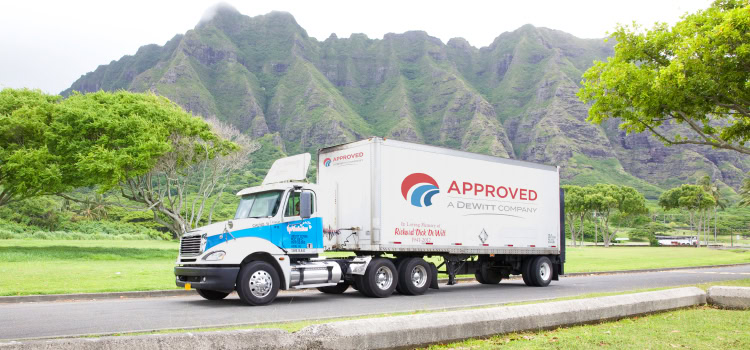
With delivery fleets on Oahu, Maui, Kauai, and the Big Island, Approved Freight Forwarders moves cargo on each island quickly and efficiently, providing direct customer service.
Navigating the unique challenges of logistics in Hawaii requires a superior measure of direct customer service. For that reason, Approved Freight Forwarders continues to expand its customer service team to ensure customers have a single point of contact.
“We understand that no matter how streamlined shipping to Hawaii may seem, it always presents unique challenges that require the expertise of our team members,” says Paul Talbert, the company’s sales VP. “Our team specializes in being trusted advisors, dedicated to finding the optimal solution for our customers and providing the highest level of value for each challenge.”
For example, Talbert says, “Sometimes it’s most effective to warehouse items on the mainland and utilize strategic consolidation points. Other times, solutions need to be warehoused on the island and delivered outward from Oahu to each island. Whatever the need, we have found that personalizing the solution yields the best value for our customers.”
Talbert believes the impression that there is one simple process for shipping to the islands is a misconception.
“Depending on a company’s specific needs, there are numerous ways to build the right supply chain to Hawaii,” he says. “Our team takes a consultative approach with each customer, aiming to find the right process for them from the front end of their supply chain all the way down to the delivery.”
Bright Outlook for Hawaii
From the perspective of its decades of experience and robust on-island teams, Approved Freight is bullish on Hawaii’s place in the logistics landscape and seascape in the future. Among the state’s many assets is its appreciation of the growing importance of sustainability. At the same time, however, emphasis on environmental concerns poses additional challenges for responsible logistics professionals.
“Hawaii’s commendable commitment to sustainability and environmental protection adds complexity to logistics operations,” Talbert explains. “With Hawaii signing onto the MOU (Memorandum of Understanding) to accelerate the adoption of electric and zero-emission light- and heavy-duty vehicles, we are confident this will continue to be an inflection point for all companies doing business in Hawaii. With a large presence in California already, we have been at the forefront of environmentally sustainable logistics solutions.”
To that end, the company recently acquired a zero-emission hydrogen truck to service port needs for shipments to Hawaii.
Looking ahead, Talbert sees three significant areas for change in Hawaii’s position in the logistics marketplace: eco-friendly offerings, speed of delivery, and the evolving landscape of freight transportation.
“As large steamship lines increasingly adopt eco-friendly solutions and the state’s ocean terminals expand their freight capabilities, Hawaii’s capacity to meet the needs of residents and businesses will only grow,” he says. “We anticipate an increasing number of customers inquiring about our most eco-friendly solutions and how they can reduce their shipping footprint to Hawaii.”
As in all matters in the world of logistics, it’s about anticipating and reacting in real time to what is around the corner. “As consumers increasingly prioritize speed, convenience, and variety, the economic pressures for reliability and affordability in servicing Hawaii will remain significant concerns for supply chain experts,” Talbert says. “However, we recognize that these factors alone cannot fully address the complexities of shipping to Hawaii.”
Approved Freight’s consultative approach to solutions promises to be a continuing advantage for navigating those complexities.
Reaching Paradise
Mark Twain called Hawaii “the loveliest fleet of islands that lies anchored in any ocean.”
Thanks to logistics professionals who constantly innovate and improve their strategies to cross the distance, the paradise that is Hawaii becomes closer and closer with every passing year.
Hawaii RFP
"*" indicates required fields
